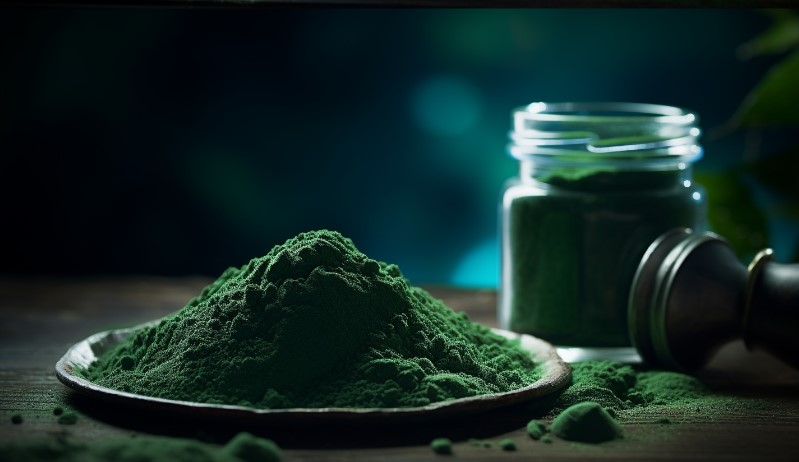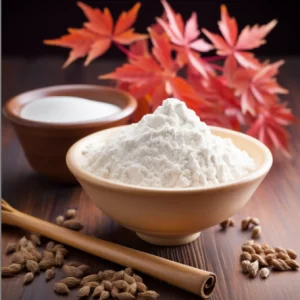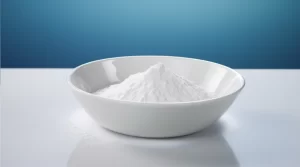The effect of spirulina

What is Spirulina?
Spirulina refers to a large class of photosynthetic filamentous primitive unicellular fungi of the Cyanobacteria phylum. Its name comes from the spiral shape of its filaments. Arthrospira maxima, Spirulina platensis and Spirulina fusiformis are the most common and most intensively studied. Spirulina species.
In addition to high protein content (70%), it also contains beta-carotene, phycocyanin, trace elements (potassium, sodium, calcium, magnesium, iron, zinc), vitamin B12, vitamin E, unsaturated fatty acids, especially is gamma-linolenic acid and phenolic compounds
It is generally believed that spirulina has anti-genotoxic, anti-cancer, immune-stimulating, anti-inflammatory, anti-hepatotoxic, anti-diabetic and anti-hypertensive effects, and is therefore widely used in hypertension, inflammatory diseases, diabetes, and non-alcoholic fatty liver disease. , nutritional supplements for malnutrition, anemia, allergic rhinitis, cancer and other diseases.
What are the proven benefits of spirulina?
Spirulina helps regulate blood pressure
Hypertension is one of the most common cardiovascular diseases (affecting 1 billion people worldwide and causing 9.4 million deaths each year) and is estimated to be present in 69% of first-time heart attack patients and 75% of patients with chronic heart failure. disease factors.
Clinical data shows that a 5 mmHg reduction in blood pressure reduces the risk of stroke and ischemic heart disease by 34% and 21% respectively
Aging, dietary factors (such as alcohol consumption, excessive salt intake, and insufficient fruit and vegetable intake), lifestyle factors (such as smoking and lack of exercise), and genetic susceptibility are all associated with the development of hypertension
A systematic literature review and meta-analysis (including 5 randomized controlled trials with a total of 230 participants) pointed out that spirulina supplementation (ranging from 1 to 8 grams per day, intervention duration from 2 to 12 weeks) Helps reduce diastolic and systolic blood pressure.
In addition, subgroup analysis found that compared with “normal blood pressure” subjects, the related systolic blood pressure lowering effect was most significant among hypertensive subjects.
Spirulina may have a positive effect on blood pressure regulation, especially for people with high blood pressure. However, it is limited by the small sample size, and more studies with larger samples and longer duration are needed for further verification.
Spirulina is rich in a variety of nutrients and can be called a natural multivitamin
Spirulina (Spirulina) can be said to be one of the most nutrient-dense foods on the planet, rich in a variety of vitamins, minerals (calcium, magnesium, zinc, copper, manganese…etc.), essential fatty acid GLA (also known as gamma flax) Oleic acid), what’s more special is that the protein content is as high as 60% to 70%, which is higher than meat and fish, so it is very suitable as a protein source for vegetarians
In addition, cyanobacteria (Spirulina) also contain phytochemicals, including chlorophyll, phycocyanin, astaxanthin, lutein, and β-carotene. These are natural antioxidants produced by plants and have immune-enhancing, antibacterial, and Anti-viral and other effects
Moreover, because the cell wall is extremely thin, highly water-soluble and easily digestible (the absorption rate can reach 95%), it has become the best choice for nutritional supplements and immune regulation.
Spirulina aids weight loss
Obesity is a public health problem that has attracted worldwide attention. It can be defined as a state in which abnormal or excessive accumulation of fat tissue damages health. Related medical problems include: type 2 diabetes, hypertension, and coronary artery disease. , various cancers, and cognitive dysfunction.
According to the World Health Organization, the number of overweight people aged 15 and above in the world will reach 2.3 billion, and more than 700 million are obese.
A systematic literature review and meta-analysis (including 5 randomized controlled clinical trials with a total of 278 participants) found that spirulina supplementation can help reduce body weight, body fat percentage, and waist circumference (but body mass index and There was no significant change in waist-to-hip ratio).
In addition, subgroup analysis based on health status showed that obese subjects had greater weight changes than overweight subjects
The underlying mechanism may be related to reducing macrophage infiltration into visceral fat, preventing hepatic fat accumulation, improving oxidative stress, microbial regulation, and appetite regulation.
Spirulina supplementation may have a positive effect on weight loss (weight loss), especially obesity. However, it is limited by the small sample size and more research is needed to further verify it.
Spirulina Benefits Type 2 Diabetes
Type 2 diabetes accounts for 90% to 95% of new cases of diabetes, and its pathophysiology involves at least seven organs and tissues, including the pancreas, liver, skeletal muscle, adipose tissue, brain, gastrointestinal tract, and kidneys
The reduced sensitivity of liver, muscle and adipose tissue to insulin, and the gradual decline of pancreatic β-cell function are hallmark features of hyperglycemia and type 2 diabetes.
A randomized controlled trial (12 weeks, 37 patients with type 2 diabetes) showed that the use of spirulina (daily dose of 8 grams) can reduce malondialdehyde and triglyceride, and increase adiponectin levels.
In addition, there were no significant changes in fasting blood glucose, glycosylated hemoglobin, insulin, total cholesterol, low-density lipoprotein cholesterol, and high-density lipoprotein cholesterol.
Spirulina does not clearly help regulate blood sugar, and more research is needed to further confirm it.
Spirulina benefits male infertility
Infertility evaluation usually begins after 1 year of trying to conceive, but in couples where the woman is of advanced age (>35 years), the majority never begin diagnostic evaluation after 6 months of pregnancy, affecting approximately 15% of married couples
Relevant tests include semen analysis, ovulation assessment, hysterosalpingogram and, if necessary, ovarian reserve and laparoscopy.
Half of these cases are due to male factor, and approximately 60% to 75% of cases of male infertility are idiopathic, as the molecular mechanisms of these defects are unknown.
Important components of the medical history include previous paternity, history of cryptorchidism, medical and surgical history, sexual dysfunction, and any use of drugs, tobacco, alcohol, or illicit drugs.
A placebo randomized controlled trial (12 weeks, 40 male patients with idiopathic infertility), group A was supplemented with 2 g of spirulina on the basis of conventional treatment, and group B received conventional treatment plus placebo. .
It was found that there was no significant difference in the improvement of semen parameters (count, motility and morphology) between the two groups, but the pregnancy rate in the Spirulina group (Group A) was 5%, while the pregnancy rate in the control group (Group B) was 0%.
Oral spirulina may have a positive effect on male infertility, but it is limited by the small sample size and more research is needed to further verify it.
Spirulina Benefits Allergic Rhinitis
Allergic rhinitis is a symptomatic rhinitis caused by the inflammatory reaction of the nasal mucosa. Symptoms include: nasal congestion, runny nose, sneezing, and nasal itching.
Other symptoms include clearing of the throat, headache, facial pain, earache, itching of the throat and roof of the mouth, and snoring
About 20% to 30% of adults and up to 40% of children are affected by this disease, causing sleep disorders, fatigue, depression and cognitive impairment, affecting quality of life and work efficiency.
A randomized, double-blind, placebo-controlled study (6 months, 150 patients with a history of allergic rhinitis) pointed out that compared with placebo, taking spirulina can significantly improve the symptoms and signs of allergic rhinitis, including: Runny nose, sneezing, stuffy nose, and itching.
Oral spirulina may be helpful in improving allergic rhinitis, but it is limited by the small sample size and more research is needed to further verify it.
Spirulina benefits fatigue
Fatigue is a subjective symptom manifested by physical discomfort, aversion to activity, or objective impairment of performance, or is also defined as a symptom indicative of a physical or mental illness (e.g., multiple sclerosis, depression) or as a result of treatment for a disease (e.g., multiple sclerosis, depression) such as chemotherapy).
Survey reports show that 5% to 20% of the general population suffer from this kind of persistent and headache-inducing fatigue.Fatigue is twice as common in women as men, but not significantly related to age or occupation
A randomized, double-blind, placebo-controlled study (8 weeks, 18 healthy men) showed that oral spirulina can help improve mental and physical fatigue. Note 5
Spirulina may be helpful in anti-fatigue, but it is limited by the small sample size and more research is needed to further verify it.
Spirulina Benefits Chronic Hepatitis C
Hepatitis C virus accounts for about 15% to 20% of acute hepatitis cases. After acute infection, about 50% to 80% of hepatitis C patients will develop chronic infection.
People with chronic hepatitis C are at high risk for life-threatening complications, including cirrhosis in 20 percent and hepatocellular carcinoma in 4 to 5 percent per year.
Epidemiological studies have also shown that hepatitis C is associated with many extrahepatic manifestations, including insulin resistance, type 2 diabetes, glomerular disease, oral manifestations, etc.
A randomized, double-blind, comparative study (6 months of 66 patients with chronic hepatitis C virus infection) found that compared to silymarin, spirulina helped improve viral load, liver function, and health-related life outcomes. quality and sexual function. Note 6
Spirulina may have a positive effect on chronic hepatitis C
Spirulina Benefits Thalassemia
Thalassemias are a group of inherited blood disorders characterized by abnormalities in hemoglobin synthesis and come in three main forms: severe, intermediate and mild.
Patients with thalassemia major usually develop severe anemia within two years of birth and require regular blood transfusions.
Routine transfusion therapy may result in complications related to iron overload, including developmental delay and failure or delay in sexual maturation.Serious conditions may cause abnormalities in the heart (dilated cardiomyopathy or rare arrhythmias), liver (fibrosis and cirrhosis), and endocrine glands (diabetes, hypogonadism, and parathyroid, thyroid, and pituitary insufficiency).
An interventional study (3 months, 60 children with thalassemia major) pointed out that taking spirulina can help improve hemoglobin levels and left ventricular global longitudinal strain (Left ventricular global longitudinal strain), and reduce the number of blood transfusions.
For subjects with thalassemia major, spirulina supplementation may be beneficial in reducing the frequency of blood transfusions and preventing heart damage, but it is limited by the small sample size and more research is needed to further verify it.
Spirulina Benefits Non-Alcoholic Fatty Liver Disease
Non-alcoholic fatty liver disease is the most common chronic liver disease, with a natural history that includes non-alcoholic steatohepatitis and cirrhosis, and will become the leading cause of liver transplantation by 2030
The spread of sedentary lifestyles and poor eating habits is the main reason for the increase in prevalence. The prevalence of the disease in type 2 diabetes patients is 50% to 75%, and it is as high as 80% to 90% in obese patients.
In addition, patients are at high risk for cardiovascular diseases (left ventricular dysfunction, atherosclerotic cardiovascular disease, cardiac conduction system abnormalities, and ischemic stroke), which are the leading causes of death.
An interventional study (6 months, 14 patients with non-alcoholic fatty liver disease) pointed out that oral spirulina can help reduce aspartate aminotransferase (AST), alanine aminotransferase (ALT), γ- Glutaminyl transpeptidase (GGT), low-density lipoprotein cholesterol, total cholesterol, ratio of total cholesterol to high-density lipoprotein cholesterol, insulin resistance, and body weight indicators. Note 8
In addition, quality of life, average levels of HDL cholesterol and hemoglobin were significantly increased
For non-alcoholic fatty liver disease, spirulina may be able to bring positive help, but it is limited by the small sample size and more research is needed to further verify it.
Spirulina improves nutritional status
Nutritional status is an important factor in maintaining health in older adults and is an important determinant of the aging process.Nutritional deficiencies often occur in the elderly and indirectly lead to physical decline, such as: impaired muscle function, bone loss, immune dysfunction, anemia, cognitive decline, poor wound healing, delayed recovery from surgery, and increased mortality.
In addition, malnutrition is the main factor causing stunted growth and death among children under 5 years old around the world, especially in developing countries. It is estimated that about 140 million children are malnourished.
A prospective study (prospective study, lasting 30 days, with 50 malnourished African children) pointed out that spirulina can significantly improve the nutritional status of the subjects (including hemoglobin, anemia, total protein and other indicators).
Spirulina increases detoxification power
Although the advancement of science and technology brings convenience to material life, it also produces a lot of industrial waste and toxic pollutants.
These environmental pollutants have become the biggest threat to human health. From common diarrhea and pneumonia to cardiovascular diseases and cancer, these harmful substances may be directly or indirectly triggered.
A literature review pointed out that spirulina can help organisms offset the effects of toxic substances (arsenic, carbon tetrachloride, hexachlorocyclohexane) and has detoxification and anti-toxic effects.
Spirulina can be used as an auxiliary natural detoxifier to fight against some toxins, but most of them are animal experiments and need to be confirmed by more human studies.
Spirulina is good for hyperlipidemia
Hyperlipidemia is excessive fat content in the blood, commonly including triglycerides or excessive fat. Over time, it is easy to accumulate on the blood vessel walls, causing the blood vessels to narrow, lose elasticity, and even gradually harden and block, leading to myocardial infarction, stroke, etc. serious illness
A systematic review and meta-analysis (including 7 studies with 552 participants) pointed out that spirulina has the ability to reduce total cholesterol, low-density lipoprotein cholesterol, triglycerides and increase high cholesterol. Effects of density lipoprotein cholesterol. Note 11
The mechanism behind it is related to the ability of phycocyanin protein to slow down cholesterol absorption, scavenge free radicals, inhibit lipid peroxidation, inhibit the performance of NADPH oxidase, increase superoxide dismutase activity, and reduce the production of pro-inflammatory cytokines.
Eating spirulina (blue algae) may have positive benefits in regulating blood lipids, but due to the heterogeneity of the included studies, more research is still needed to further verify it.


